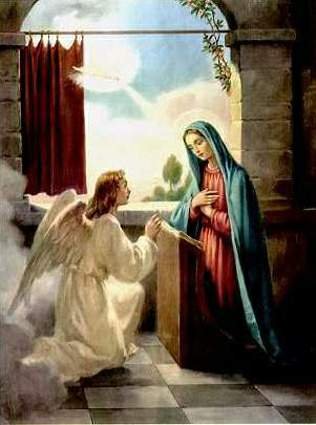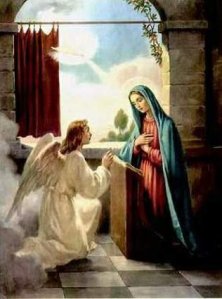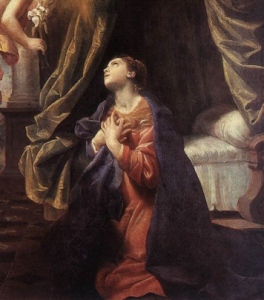This icon is very distinct and famous, often gracing the apse of the sanctuary in Orthodox and Eastern Catholic Churches. It is named Theotokos of the Sign because it refers to Isaiah, 7:14:

“Therefore the Lord himself will give you a sign. Behold, a young woman shall conceive and bear a son, and shall call him Immanuel.”
The image seeks to mystically capture the moment when Mary gave her yes to the Angel Gabriel, assenting to become the Mother of God. Mary is usually depicted from above her waist and holds her arms up to each side at the level of her head in an ancient gesture of prayerful appeal as she assents to God’s wishes: “Behold I am the handmaid of the Lord; let it be to me according to your word.” (Lk 1:38) Jesus is portrayed in a circle of light in her bosom, representing her womb. The Christ-child is represented, like in all other icons, as older and wise in the face, indicating to us that he is fully human, but also fully God in his timeless wisdom. His right hand is raised in blessing and his left hand often holds a scroll- indicating the message of salvation that he will soon impart.
This type of icon is sometimes called Platytera or meaning “wider.” Poetically, this means that Mary’s womb, when it contained Jesus, was the dwelling place of the Creator of the Universe, making her womb “more spacious than the heavens.” Another name given to this type of icon is Oranta, which comes from the Latin word for prayer.
This icon is a beautiful reflection on the great mystery of Jesus’ incarnation, and the debt that we owe to Mary for saying yes to God’s will, giving us God’s own Son.
To see all of my posts on Iconography, click here.
To see other icons of the Theotokos of the Sign, see below (click to enter the gallery).




 The great mystery of the Annunciation has a hidden power and fullness for the legionary. Attending to it, the Legionary learns the will of God in how he chooses to operate int he world. He chooses a lowly maiden in a small town called Nazareth in a little known country in the very powerful Roman Empire. Yet God, from before time began, predestined her for a very important mission, indeed the most important mission after the savior himself. She was to be his mother. God did not have to act this way. He wasn’t constrained to do so. But because of the way that he determined best, he made all of salvation depend upon the yes of this lowly maiden whose heart was aflame with the desire for God’s glory.
The great mystery of the Annunciation has a hidden power and fullness for the legionary. Attending to it, the Legionary learns the will of God in how he chooses to operate int he world. He chooses a lowly maiden in a small town called Nazareth in a little known country in the very powerful Roman Empire. Yet God, from before time began, predestined her for a very important mission, indeed the most important mission after the savior himself. She was to be his mother. God did not have to act this way. He wasn’t constrained to do so. But because of the way that he determined best, he made all of salvation depend upon the yes of this lowly maiden whose heart was aflame with the desire for God’s glory.
